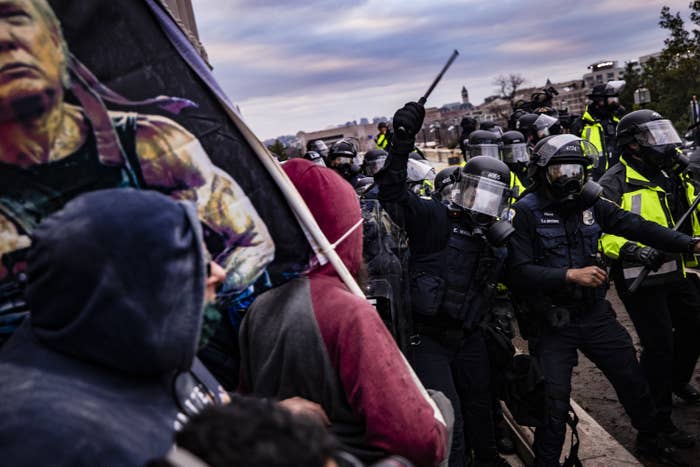
WASHINGTON — A member of former president Donald Trump’s administration who was charged with assaulting police during the Jan. 6 insurrection will remain in jail while his case goes forward, a judge ruled Tuesday, finding that Federico Klein’s past public service only hurt his case for going home now.
US Magistrate Judge Zia Faruqui in Washington, DC, noted that when Klein joined the Trump administration in 2017 — he was a political appointee in the State Department — he took an oath to defend the US Constitution “against all enemies, foreign and domestic.” That Klein is now accused of joining a mob of hundreds of people who descended on the US Capitol to disrupt Congress from exercising its constitutional duties was “extremely concerning,” Faruqui said as he announced his decision to keep him in custody.
“There were enemies, domestic, directly at the heart of America's democracy and a person who has sworn an oath to protect then switched sides,” Faruqui said.
Klein had worked in the Office of Brazilian and Southern Cone Affairs and was still employed at the State Department when he allegedly participated in the insurrection; he held top secret security clearance that had been renewed in 2019. He is not only charged with illegally going onto the Capitol grounds, but also with using a police riot shield to attack officers protecting one of the entranceways. He’s the first alleged Capitol rioter identified as a member of the Trump administration; he resigned on Jan. 19.
According to his charging papers, Klein repeatedly refused orders from police on the scene to back away from an entrance to the Capitol and used what the government described as an “apparently stolen” police riot shield to try to break through a police line. Prosecutors said videos from that day allegedly recorded him saying, “We just want a fair election,” and calling for “fresh people” to help push through the police line. In a footnote, the government also said that a video captured him trying to help an officer later who had been dragged down the steps.
Two witnesses identified Klein as a man pictured on one of the FBI’s wanted posters, according to his charging papers, including a former colleague at the State Department. The FBI also matched a phone number for Klein with cell tower data around the Capitol on Jan. 6. Charging papers were filed against him on March 2. He was arrested two days later.
Prosecutors argued in favor of keeping Klein behind bars, citing the fact that he was charged with using a dangerous weapon — the riot shield — to assault police officers and that he remained a danger to the community given his willingness to use violence that day. Assistant US Attorney Jocelyn Bond told Faruqui on Tuesday that the government believed Klein’s position at the time as a federal employee with high-level security clearance only “amplified” the threat he posed since it showed his willingness to disregard the oath that he had taken.
“He was a very enthusiastic participant in the violence,” Bond said.
Klein’s lawyer, Stanley Woodward Jr., didn’t concede that he had participated in the insurrection and was, in fact, the person whom the government identified in videos from the Capitol. He argued that there were gaps in the government’s case against his client, including that prosecutors could only speculate about his motivation for going to the Capitol, that the person identified as him was wearing clothing that wasn’t especially distinctive, and that prosecutors didn’t say how exactly he had obtained the police riot shield — a point that Faruqui said was irrelevant since there was no reason for a civilian to have it. Woodward also noted that Klein had served in the Marines in Iraq.
Woodward’s arguments focused largely on comparing the accusations against Klein to those of other people charged in the insurrection who were allowed to go home while their cases are pending. Other defendants who are charged with assaulting police at the Capitol have been released, but Bond argued that some of those cases didn’t involve the same level and duration of violence.
The majority of people charged with participating in the insurrection have been allowed to go home while their cases are pending after making their first court appearance following their arrest. Prosecutors generally have reserved requests for pretrial detention for cases involving assaults on police officers, threats to commit future violence, and evidence of planning or conspiracy.
Addressing Woodward’s argument that there was a lack of evidence about Klein’s motivations on Jan. 6, Bond said that while it was true that the government couldn’t read his mind, he had numerous chances to turn around and didn’t. It was “well documented” that Congress was meeting in a joint session that day to certify the results of the presidential election, she said.
In announcing his decision from the bench, Faruqui said he gave Klein credit for his military and government service, but that part of his background also gave the judge “greater concerns” about “how someone who has sworn to defend the Constitution … could then participate in the attempt to stop the administration of the Constitution of the United States.”

